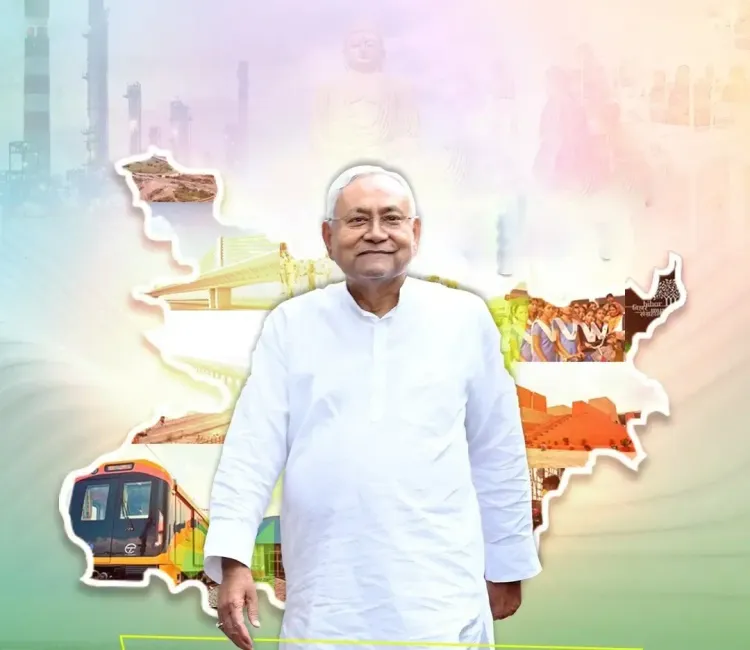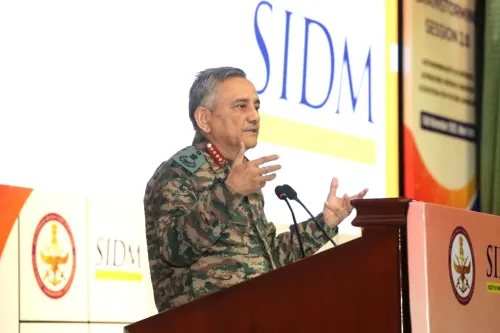How has Nitish Kumar silenced critics with NDA's success in Bihar?

Synopsis
Key Takeaways
- Nitish Kumar's enduring influence is evident in the NDA's electoral success.
- The slogan “Tiger abhi zinda hai” symbolizes his political resilience.
- High women's turnout in elections indicates strong voter engagement.
- His governance strategies focus on law and order, infrastructure, and social welfare.
- Nitish Kumar's adaptability in coalition politics is a key to his sustained leadership.
New Delhi, Nov 14 (NationPress) On the eve of the vote counting for the Bihar Assembly elections, massive banners outside the Janata Dal (United) headquarters proclaimed: “Tiger abhi zinda hai” (Tiger is still alive). As the counting began and initial trends emerged, it became evident that this phrase represented more than mere rhetoric; it symbolized the lasting political strength of Chief Minister Nitish Kumar in Bihar.
According to trends reported by the Election Commission of India (ECI), the ruling National Democratic Alliance (NDA) is demonstrating a substantial lead, with seat counts well over the majority threshold of 122 in a 243-seat Assembly. By approximately 2:30 p.m., the NDA was projected to secure over 200 seats. These impressive figures not only highlight the arithmetic of alliances but also underscore Nitish Kumar’s pivotal role within the coalition, which has seen its influence grow over time.
Born in Bakhtiarpur, Patna district in 1951, Nitish Kumar hails from humble beginnings: his father, Kaviraj Ram Lakhan Singh, was a traditional Ayurvedic doctor and freedom fighter, while his mother was Parmeshwari Devi. He pursued his education at the Bihar College of Engineering (now NIT Patna) and holds a B.Sc. in Engineering.
His political journey is rooted in the JP Movement and socialist ideals. He has occupied various significant roles, including Union ministerial posts, before ascending to the position of Chief Minister of Bihar.
Critics like Prashant Kishor from the Jan Suraaj Party have questioned Nitish Kumar’s effectiveness, labeling him as “physically tired and mentally retired” and suggesting that he has become a political “figurehead” for the BJP.
Congress President Mallikarjun Kharge has also accused the BJP of pushing Nitish toward “mental retirement.” Yet, analysts contend that Nitish Kumar retains significant influence and has not waned in his political relevance.
As per his official profile, Nitish Kumar took office in November 2005 with a clear mandate: to establish the rule of law, dismantle what was often referred to as “jungle raj,” and foster inclusive development across all societal sectors.
The governance legacy of Nitish Kumar is highlighted on his official website, which notes that he has prioritized transparency, institutional reform, and inclusive growth.
The site claims, “In just a few years, Shri Kumar has transformed numerous public organizations and systems... he has succeeded in ensuring effective law and order while simultaneously achieving significant advancements in human resource development and infrastructure.”
Key initiatives under his leadership include: the prohibition of alcohol in 2016, enhancing access to education for women, improving rural connectivity, decentralizing governance, and promoting social welfare. These measures have played a crucial role in altering the public perception of Bihar, transforming it from a state characterized by governance failure to one demonstrating quantifiable progress in its infrastructure and public institutions.
Nitish Kumar’s political journey has been marked by adaptability. His long-standing alliance with the BJP in the NDA, starting in the late 1990s, allowed him to overcome the dominance of Lalu Prasad Yadav’s RJD in 2005 and establish himself as a credible reformist.
The split from the NDA in 2013 and the disappointing results in the 2014 Lok Sabha elections, where JD(U) secured only two seats, constituted a significant setback. In a surprising move, he resigned and appointed Jitan Ram Manjhi as his successor, indicating a new social coalition by promoting a leader from the Musahar community. These events underscored his political acumen and ability to reinvent himself.
He later rejoined the NDA and continued to serve as Chief Minister. On January 28, 2024, he took the oath for a historic ninth time.
In the 2020 Bihar Assembly elections, the NDA achieved a simple majority with 125 out of 243 seats, fewer than they had in 2025, while the Mahagathbandhan (RJD-led) secured 110 seats.
The slogan “Tiger abhi zinda hai” signifies his enduring brand in Bihar's political landscape.
With women's turnout hitting record highs (69% in Phase 1 and 74% in Phase 2) in the 2025 elections, and with caste groups (especially EBCs/Mahadalits) firmly aligned, Nitish Kumar’s social base remains robust.
His track record in addressing law and order, educational reforms, rural infrastructure, and welfare initiatives gives him a distinct advantage.
His adeptness at managing coalition politics, maintaining JD(U)'s relevance, balancing the BJP’s ambitions, and adapting to evolving dynamics underscores his strategic importance to the NDA.
In the book 'Broken Promises: Caste, Crime and Politics in Bihar', author Mrityunjay Sharma states: “In a state where every regional party was closely associated with a specific caste, such as the RJD with Yadavs, the LJP with Paswans, and the JMM with Adivasis, he (Nitish) took every possible measure to not be viewed as a Kurmi-centric party.”
Sharma characterizes the 1990s in Bihar as “one of the most controversial periods in the history of any state in independent India,” depicting it as a dark time rife with political criminalization, nepotism, and caste conflicts.
Nitish Kumar is widely credited with rescuing Bihar from the ‘jungle raj’ era — a term used to describe the chaos and criminalization during Lalu’s governance from 1990-2005, when Bihar was beset by caste violence and crime syndicates. During that period, the derogatory expression “Bhurabal Saaf Karo” emerged, referring to the elimination of the four upper castes: Bhumihar, Rajput, Brahmin, and Lala. This phrase is often linked back to Lalu.
Nitish Kumar has guided Bihar from stagnation to progress.
As the counting for the 2025 elections unfolds, trends suggest that the NDA is poised to achieve a significant and historic milestone. In these projections, Nitish Kumar is not merely a Chief Ministerial candidate; he stands as the unifying figure and the face of the alliance in Bihar. Posters celebrating him epitomize the political reality where the NDA’s fortunes are viewed as closely tied to his leadership.
As the counting advances and the NDA’s supremacy becomes more apparent, Nitish Kumar emerges not just as a seasoned leader, but as the emblem of the NDA in Bihar, a status earned through years of governance, adaptability, and electoral strategy.
The BJP is asserting itself as the ‘big brother’ within the NDA. Current counting trends indicate the BJP is leading and surpassing JD(U), reflecting the BJP’s growing influence within the National Democratic Alliance.









